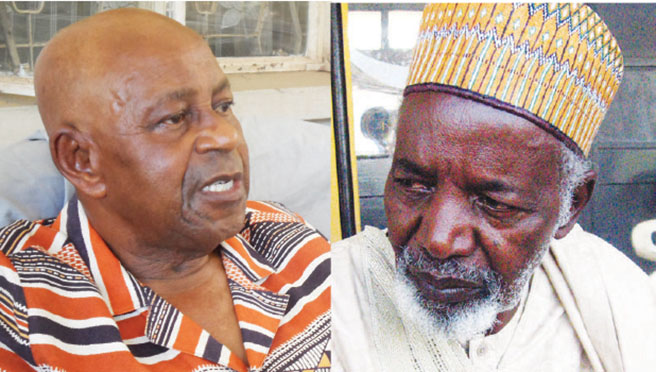By Ishaya Ibrahim
and Henry Oduah
A historical ally of President Muhammadu Buhari has banded with a historical adversary to rail against the new pump price of fuel, which caught consumers by surprise on Thursday, May 12, and scattered family budgets with the ripple effects.
Transport fares have gone up everywhere as a consequence, speeding off with the prices of everything from foodstuff, other household items, plus school fees, to the cost of a hair cut in small shops, and grinding pepper in open markets in Kano and Calabar.
Buhari’s right hand man, Tam David-West, picked holes in the hike in fuel price from N86 to N145 per litre.
The professor of virology and former petroleum minister argued from Ibadan that the increase announced by Minister of State for Petroleum, Ibe Kachikwu, does not make sense.
His view resonated up North with Buhari’s traditional critic, former Kaduna State Governor, Balarabe Musa, who accused the president and his All Progressives Congress (APC) members of fleecing Nigerians to amass a war chest for the general election in 2019.
Importing at N86, selling at N145
“It is stupid for two reasons. First, the same NNPC (Nigerian National Petroleum Corporation) a few days ago was filling petrol stations and selling fuel for N86. How can you turn around a few days after to say N145?” David-West asked.
He said the stock now sold at N145 per litre had been imported before the announcement.
“No new petroleum has come in. It takes two weeks for vessels from Europe to arrive Nigeria. There is something wrong with the logic.”
Deregulating, fixing price
The second abnormality with the increase, David-West insisted, is the directive to marketers not to sell above N145.
“How can you say people should import fuel and you tell them how to sell it? It is stupid. You cannot tell a private man to import fuel into the country, and when it arrives the government will now tell him how much to sell it.
“It is stupid. It negates basic economic principles. When I see Buhari, I will make a formal statement. I cannot see how they can justify it.”
Other queries
David-West said he has noted 12 areas to take Kachikwu on, not only on fuel price, but also how the NNPC is run.
“But if I say it now, they will misunderstand me. They would say I want to be minister. I don’t want to be minister. My record there is clear.
“Okay, look at what [Kachikwu] said – that there is hydrocarbon in every part of Nigeria; which is not possible. He is saying a lot of things that are outrageous.
“When the time comes I will take him on. I don’t want to say it now so that it is not misunderstood. I want to see Buhari first.”
David-West said he believes that Buhari does not know what Kachikwu was cooking before the hike.
“Buhari is not in the country. They rushed it because they knew that if he was around he would not allow them. You increased petrol price to N145, and you said immediately, like a military dictator.”
Selling petrol for N40 per litre
David-West argued that he was wrongly quoted that fuel was going to sell for N40 per litre once Buhari got into office.
“I said if they removed 14 items they are adding to pump price which should not be there, petrol would sell for N40 per litre.
“There are a lot of things they added to inflate it. That is cheating.
“They are adding NPA (Nigeria Ports Authority) charge, jetty depot price, storage payment, margin for retailers, bank charges, transportation from Europe, bridging, and all sorts of things.
“If they remove all these, petrol price will come down to N40. A Nigerian professor of petroleum in Texas has confirmed my figure.
“Let me tell you about bridging. When I was minister, bridging was paid by the government, not by consumers.
“I met N400 million in the bridging account when I was minister. If you take petrol from Port Harcourt to Sokoto, the government pays for the haulage, not consumers.”
Balarabe Musa adds new twist
Musa added a new twist to the debate, saying the motive for the sudden removal of fuel subsidy is to enrich APC leaders ahead of the 2019 vote.
“We believe the objective of this mindless increase is first to balance the 2016 budget; second, to cover up stolen funds that cannot be accounted for; and third, to enrich APC leaders so that in 2019 they can compete with the PDP (Peoples Democratic Party) naira for naira,” he alleged.
Are you sure of your facts, Musa was asked. He retorted: “Find out whether it is true or not. Investigate and use your understanding, and you will come to the same conclusion.”
‘Increment harsh’
Musa described the price increase as mindboggling, especially coming at a time when inflation is at a record 12.4 per cent.
He scoffed at Abuja’s explanation that deregulation would lead to efficient supply of petroleum products.
“There explanation is that if they surrender to the private sector in the oil industry, oil will be available everywhere. But this is the promise that all previous governments have been making, and they never met.
“Oil was never available as a result of the increase.
“There is also the question of price. Even if oil is easily available everywhere, there is a rational price.
“People can’t afford to buy at any price. People will be forced to sacrifice their whole meal for the family for the sake of buying a litre of petrol.
“True availability of petrol must be matched with a price that people can afford. N145 is not affordable if you take into account the level of poverty in this country, unemployment and inflation, the end result is that it may be available but not affordable.”
Credibility gap
In January 2012, former President Goodluck Jonathan removed subsidy on fuel, jacking up the price from N65 to N141 per litre.
In reaction, furious Lagosians rallied round Tunde Bakari’s Save Nigeria Group (SNG) to shut down the megacity.
The Nigeria Labour Congress (NLC) crippled commercial activities in Abuja, Kano, and other major cities, forcing Jonathan to meet Nigerians halfway – N97 for a litre.
But this time around, many Nigerians are not likely to participate in the call by the NLC for strike against the new price. “We can trust this government. It has credibility,” they say.
Musa countered, however, that a government that can be indifferent to the suffering of the people, particularly under these circumstances, cannot be credible. “It’s not possible. It is self-deception.”
He asked Abuja to cancel the price increase and find other ways of balancing the 2016 budget.
“This increment itself is corruption. There cannot be any other reason for this mindless and unprecedented increase. An 80 per cent increase under the present condition?
“The present condition is the worse. Even the president himself admitted that it is the worst since 1960. So why making the suffering of the people even more?
“Nigeria is in the situation it finds itself because the government has surrendered to private enterprise.”
Why NNPC is exempted from TSA
It was learnt that the government has exempted ministries, departments and agencies (MDAs) which operate accounts with joint venture partners from Treasury Single Account (TSA).
The NNPC and six foreign multinationals – Shell, Agip, Chevron, ExxonMobil, Elf and Texaco (now merged with Chevron) – operate joint ventures (JVs).
Buhari agreed that the NNPC should be exempted from TSA because of the delay in paying the share of the profits of JV partners.
But many argue that the exemption of the NNPC could encourage corruption. There are also fears about unremitted funds.
Intricacies of JVs, JOAs
In a joint venture, ownership, risks, and returns are shared among partners.
Unlike a Memorandum of Understanding (MoU), a Joint Operating Agreement (JOA) contains only the basic understanding on a JV without fiscal incentives.
JOA confers on the NNPC the rights of a concessionaire with the other players who are operators in a “concession system”.
In simpler terms, the NNPC reserves the sole right as conferred on it by law to stand in the place of the government in protecting Nigeria’s interests in the exploration, production, refining, and distribution of petroleum and other related products.
Likewise, JOA hands operators the right to carry out upstream (drilling of crude) activities in the onshore Niger Delta, coastal offshore areas, and in the deep waters.
On its own, the NNPC cannot supply 2.5 million barrels of oil on daily demand.
Its subsidiary, the Nigerian Petroleum Development Company (NPDC), produces a mere 15,000 barrels per day (bpd) from its four oil and gas fields.












